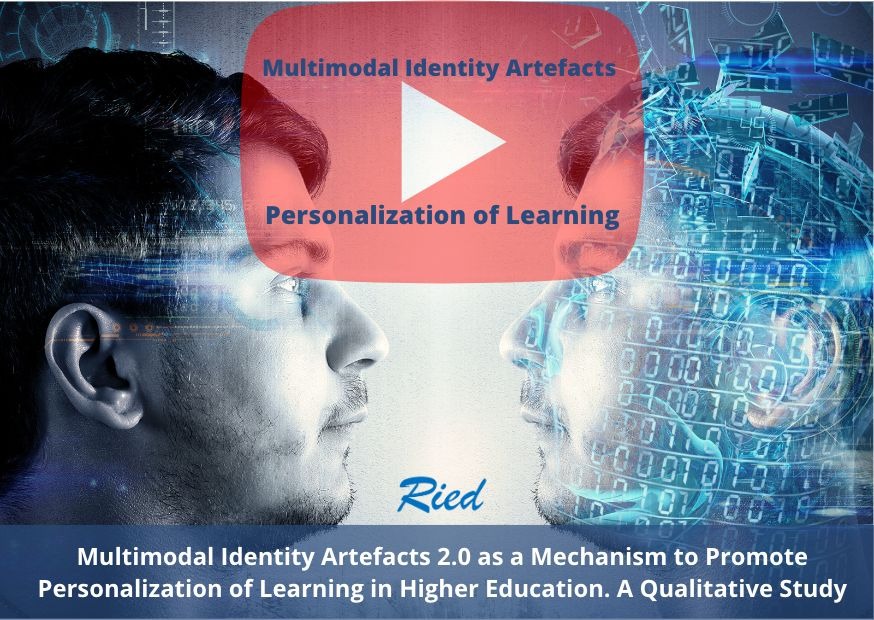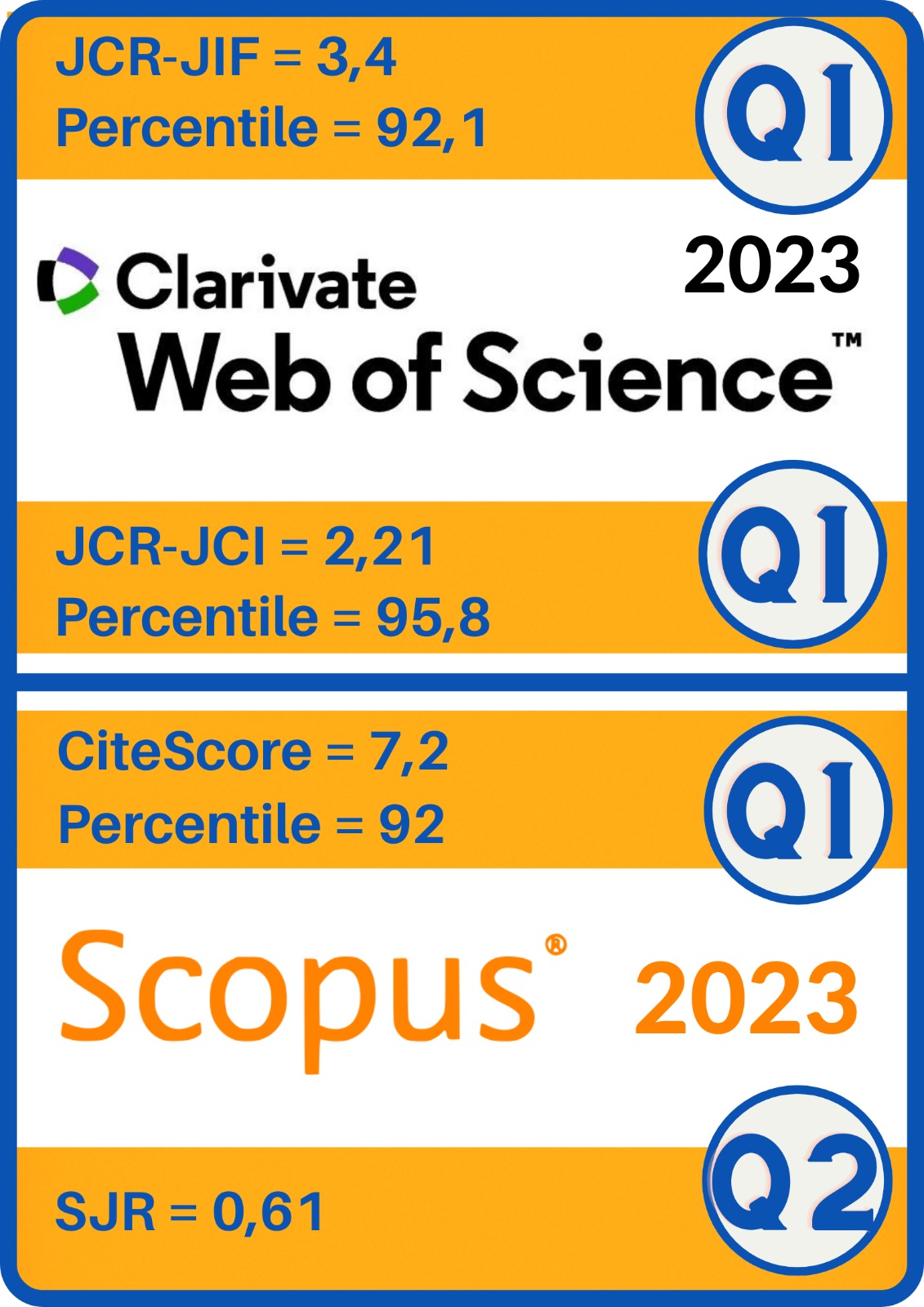Multimodal Identity Artefacts 2.0 as a Mechanism to Promote Personalization of Learning in Higher Education. A Qualitative Study
DOI:
https://doi.org/10.5944/ried.26.2.36227Keywords:
higher education, information and communication technologies, qualitative analysisAbstract
The field of education, in general, and higher education, in particular, has been strongly affected by the digital transformations that have had an impact on the life-long, life-wide, and life-deep learning processes that take place throughout our lives. A challenge associated with these transformations is the linking of learning experiences, connecting the needs, motivations and interests of learners with educational opportunities to promote learning with greater meaning and personal value. The objective of this work was to design, implement and evaluate a digitally mediated educational practice in higher education based on the pedagogical usage of identity artefacts made by the learners themselves. The design of the pedagogical practice comprises four phases: elaboration of identity artefacts; personal-academic linking; fieldwork and development of an artefact (video) posted on a YouTube channel, as well as self-assessment of what was learnt. 64 university students, aged between 20 and 32 (M = 21.5) participated. The results obtained permit the illustration and analysis of the identity artefacts produced, their relationship with the chosen topics, as well as what was learnt according to the perception of the students and the teaching team by means of an evaluation rubric. It concludes by highlighting the evidence of this educational practice in the promotion of academic, personal and procedural learning. These factors are discussed using the existing literature on the educational uses of identity artefacts as starting point and subsequently suggesting some future lines of research.
FULL ARTICLE:
https://revistas.uned.es/index.php/ried/article/view/36227/27602
Downloads
References
Akkerman, S. F., y Bakker, A. (2011). Boundary crossing and boundary objects. Review of Educational Research, 81(2), 132-169. https://doi.org/10.3102/0034654311404435
Álvarez, A., Peña Teeters, L., Hamm-Rodríguez, M., y Dimidjian, S. (2021). Understanding children’s funds of identity as learners through multimodal self-expressions in Mexico City. Learning, Culture and Social Interaction, 29, 1-13. https://doi.org/10.1016/j.lcsi.2021.100513
Bagnoli, A. (2009). Beyond the standard interview: the use of graphic elicitation and arts-based methods. Qualitative Research, 9(5), 547-570. https://doi.org/10.1177/1468794109343625
Bremmer, N., Sakata, N., y Cameron, L. (2022). The outcomes of learner-centred pedagogy: A systematic review. International Journal of Educational Development, 94, 1-11. https://doi.org/10.1016/j.ijedudev.2022.102649
Coll, C. (2018). Procesos de aprendizaje generadores de sentido y estrategias de personalización. En C. Coll (Coord.), Personalización del aprendizaje. Graó.
Coll, C., Esteban-Guitart, M., y Iglesias, E. (2020). Aprendizaje con sentido y valor personal. Estrategias, recursos y experiencias de personalización educativa. Editorial Graó.
Cummins, J., Hu, S., Markus, P., y Montero, M. K. (2015). Identity texts and academic achievement: Connecting the dots in multilingual school contexts. TESOL Quarterly, 49(3), 555-581. https://doi.org/10.1002/tesq.241
DeWitt, D., Alias, N., Siraj, S., Yaakub, M. Y., Ayob, J., y Ishak, R. (2013). The potential of Youtube for teaching and learning in the performing arts. Procedia – Social and Behavioral Sciences, 103(26), 1118-1126. https://doi.org/10.1016/j.sbspro.2013.10.419
Díaz-Barriga, F., y Vázquez-Negrete, V. (2020). Avatares y cajas de herramientas: Identidad digital y sentido del aprendizaje en adolescentes de secundaria. Revista Electrónica Educare, 24(1), 2-23. https://doi.org/10.15359/ree.24-1.1
Díaz-Barriga, F., López, E., y Vázquez-Negrete, V. I. (2018). Exploración de los fondos de identidad en estudiantes de posgrado mediante una adaptación de la Multimetodología autobiográfica extendida (MAE). Papeles de Trabajo sobre Cultura, Educación y Desarrollo Humano, 14(1), 1-22.
Díaz-Herrera, C. (2018). Investigación cualitativa y análisis de contenido temático. Orientación intelectual de revista Universum. Revista General de Información y Documentación, 28(1), 119-142. https://doi.org/10.5209/RGID.60813
Engel, A., y Coll, C. (2021). La identidad de aprendiz: el modelo de Coll y Falsafi. Papeles de Trabajo sobre Cultura, Educación y Desarrollo Humano, 17(1), 1-12.
Engel, A., y Membrive, A. (2018). Contextos de actividad, experiencias de aprendizaje y trayectorias personales. La articulación de los aprendizajes escolares y no escolares. En C. Coll (Ed.), Personalización del aprendizaje (pp. 19-22). Graó.
Esteban-Guitart, M. (2016). Funds of identity. Connecting meaningful learning experiences in and out of school. Cambridge University Press. https://doi.org/10.1017/CBO9781316544884.003
Esteban-Guitart, M. (2021). Advancing the funds of identity theory: a critical and unfinished dialogue. Mind, Culture, and Activity, 28(2), 169-179. https://doi.org/10.1080/10749039.2021.1913751
Esteban-Guitart, M., Monreal-Bosch, P., Palma, M., y González-Ceballos, I. (2020). Sustaining students’ identities within the context of participatory culture. Designing, implementing and evaluating an interactive learning activity. Sustainability, 12(12), 1-13. https://doi.org/10.3390/su12124870
Gee, J. P., y Esteban-Guitart, M. (2019). Designing for deep learning in the context of digital and social media. [El diseño para el aprendizaje profundo en los medios de comunicación sociales y digitales]. Comunicar, 58, 9-18. https://doi.org/10.3916/C58-2019-01
González-Patiño, J., y Esteban-Guitart, M. (2014). Some of the challenges and experiences of formal education in a mobile-centric society. Digital Education Review, 25, 64-86.
Hogg, L., y Volman, M. (2020). A synthesis of funds of identity research: Purposes, tools, pedagogical approaches, and outcomes. Review of Educational Research, 90(6), 862-895. https://doi.org/10.3102/0034654320964205
Istance, D., y Kools, M. (2013). OECD work on technology and education: Innovative learning environments as an integrating framework. European Journal of Education, 48(1), 43-57. https://doi.org/10.1111/ejed.12017
Massieu, A., y Díaz-Barriga, F. (2021). Vídeos educativos en YouTube: una herramienta promotora de habilidades clínicas en estudiantes de medicina. Educación Médica, 22(4), 277-282. https://doi.org/10.1016/j.edumed.2020.03.001
Oller, J., Engel, A., y Rochera, M. J. (2021). Perzonalizing learning through connecting students’ learning experiences: an exploratory study. The Journal of Educational Research, 114(4), 404-417. https://doi.org/10.1080/00220671.2021.1960255
Pahl, K., y Rowsell, J. (2010). Artifactual Literacies: Every Object Tells a Story. Teachers College Press.
Poole, A. (2017). Funds of knowledge 2.0: Towards digital funds of identity. Learning, Culture and Social Interaction, 13, 50-59. https://doi.org/10.1080/1743727X.2021.2011195
Poole, A. (2021). Towards a multimodal method for identifying and interpreting funds of identity derived from avatars. International Journal of Research & Method in Education, 45(5), 505-517. https://doi.org/10.1080/1743727X.2021.2011195
Poole, A., y Huang, J. (2018). Resituating funds of identity within contemporary interpretations of perezhivanie. Mind, Culture, and Activity, 25(2), 125–137. https://doi.org/10.1080/10749039.2018.1434799
Silseth, K., y Erstad, O. (2018). Connecting to the outside: Cultural resources teachers use when contextualizing instruction. Learning, Culture and Social Interaction, 17, 56-68. https://doi.org/10.1016/j.lcsi.2017.12.002
Subero, D., Llopart, M., Siqués, C., y Esteban-Guitart, M. (2018). The mediation of teaching and learning processes through identity artefacts. A vygotskian perspective. Oxford Review of Education, 44(2), 156-170. https://doi.org/10.1080/03054985.2017.1352501
Verhoeven, M., Polman, J. L., Zijlstra, B. J. H., y Volman, M. (2021). Creating space for agency: A conceptual framework to understand and study adolescents’ school engagement from a funds of identity perspective. Mind, Culture, and Activity, 28(2), 125-137. https://doi.org/10.1080/10749039.2021.1908363
Volman, M., y Gilde, J. (2021). The effects of using students’ funds of knowledge on educational outcomes in the social and personal domain. Learning, Culture and Social Interaction, 28, 1-14. https://doi.org/10.1016/j.lcsi.2020.100472
Walkington, C., y Bernacki, M. L. (2020). Appraising research on personalized learning: Definitions, theoretical alignment, advancements, and future directions. Journal of Research on Technology in Education, 52(3), 235-252. https://doi.org/10.1080/15391523.2020.1747757
Zhang Yu, C., García-Díaz, S., García-Romero, D., y Lalueza, J. L. (2021). Funds of identity and self-exploration through artistic creation: Addressing the voices of youth. Mind, Culture, and Activity, 28(2), 138-151. https://doi.org/10.1080/10749039.2020.1760300
Zipin, L., Brennan, M., y Sellar, S. (2021). Young people pursuing futures: making identity labors curricular. Mind, Culture, and Activity, 28(2), 152-168. https://doi.org/10.1080/10749039.2020.1808687









